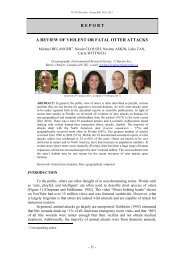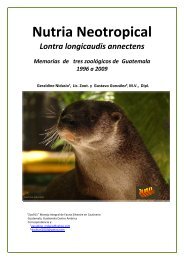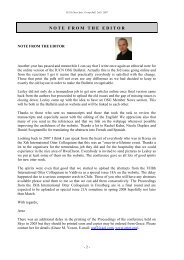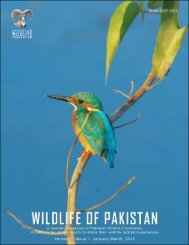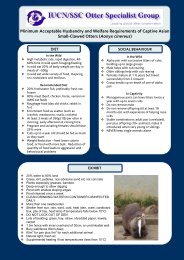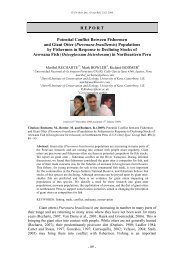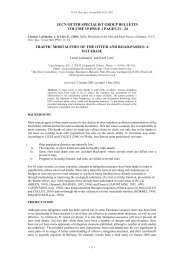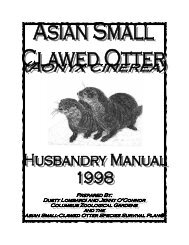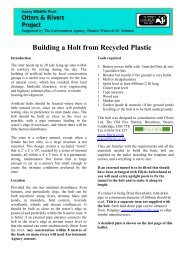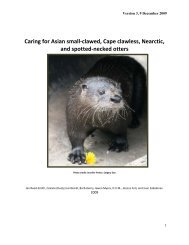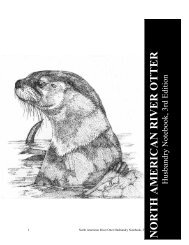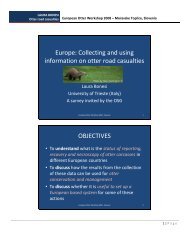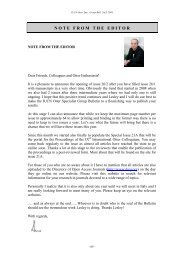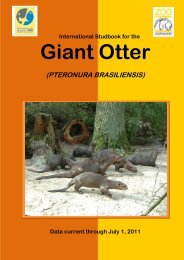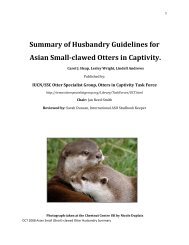International Giant Otter Studbook Husbandry and Management
International Giant Otter Studbook Husbandry and Management
International Giant Otter Studbook Husbandry and Management
Create successful ePaper yourself
Turn your PDF publications into a flip-book with our unique Google optimized e-Paper software.
successive feedings, health problems or/<strong>and</strong> formula failure may exist. If problems persist,<br />
deadly health problems could soon arise. Vet attention must be sought immediately. If<br />
defecation occurs too frequently, the formula might not be fully digested/assimilated into the<br />
body <strong>and</strong> the formula may not be adequate or other health problems may exist.<br />
<strong>Otter</strong>s should not strain to defecate or urinate, if they do, this can indicate serious health<br />
problems. Constipation can also cause bloating (i.e. a tight distended abdomen), abdominal<br />
cramping, flatulence, <strong>and</strong> digestion problems, <strong>and</strong> if continued <strong>and</strong> severe, possibly death. For<br />
example, small lumps of powder in the mixed liquid formula could cause<br />
intestinal/stomach blockage, prevent defecation, <strong>and</strong> result in death. (All lumps must be<br />
removed before feeding. See Section 6). If cubs do not urinate along with defecation, this<br />
could indicate dehydration or other medical problems (i.e. urinary blockages etc.). Urine should<br />
be yellow in color <strong>and</strong> eliminated in ample amounts (in relation to fluid amounts offered).<br />
Animals must be well hydrated at all times. Dehydration can occur from health problems<br />
such as heat stress, severe respiratory diseases, fever, vomiting, <strong>and</strong> diarrhea (esp. when severe<br />
<strong>and</strong>/or constant) <strong>and</strong> from inadequate amounts of fluid within/in addition to the formula/diet<br />
(esp. during weaning or when milk formula dilution is too strong) etc. (Merck 1986).<br />
Dehydration can also worsen constipation <strong>and</strong> lead to a rise in body temperature if severe<br />
enough.<br />
Dehydration is evident when the cub’s skin is tight to its body, the elasticity of the skin is<br />
decreased, its eyes are sunken in <strong>and</strong> its body looks shrunken, the nictitating membrane<br />
(common name: third eyelid) covers part of the eye, it urinates infrequently <strong>and</strong>/or in small<br />
amounts, or it has dark yellow urine. The cub’s gums can also be dry or sticky <strong>and</strong> the eyes can<br />
also look dry. To test for dehydration, the skin over the cub’s shoulders or back should be used<br />
to conduct the test. The skin over the neck should not be used, as it may give a false reading. A<br />
piece of skin should be grabbed firmly between the h<strong>and</strong>rearer’s thumb <strong>and</strong> forefinger <strong>and</strong> it<br />
should be pulled upwards away from the cub’s body. (The skin should be shaped like a small<br />
tent <strong>and</strong> it should not be pulled hard.) The skin should then be released. If the skin does not fall<br />
fairly quickly (i.e. nearly immediately) <strong>and</strong> smoothly back to the otter’s body (i.e. it is not<br />
elastic), the cub is probably dehydrated. The more dehydrated the cub is, the more slowly the<br />
“tent” will return to a flat position. If the skin st<strong>and</strong>s <strong>and</strong> does not fall back to the body, severe<br />
dehydration is probable.<br />
Often cubs are dehydrated when h<strong>and</strong>rearers first receive them. Cubs that are<br />
dehydrated must be hydrated with at least water (or electrolyte solutions for general use if<br />
health conditions permit) before they are fed diets/formulas. If a cub has severe <strong>and</strong><br />
continued diarrhea with a particular formula, <strong>and</strong> prior formula dilution hasn’t reduced diarrhea<br />
<strong>and</strong> no other health problems are causing diarrhea, the cub should be given at least water or an<br />
electrolyte solution, for at least one feeding. This will let the stomach <strong>and</strong> digestive system rest<br />
as well as replace fluids lost from diarrhea. The formula that has caused this problem should be<br />
discontinued (i.e. not fed any longer) <strong>and</strong> a new formula (i.e. by diluting it with water or an<br />
electrolyte solution if cubs are still experiencing health problems) should be slowly introduced.<br />
Amounts of food fed can also be temporarily reduced to help relieve the stress on the stomach.<br />
(The administration of antibiotics is not recommended, if the problem is only caused by the<br />
formula.)<br />
230



